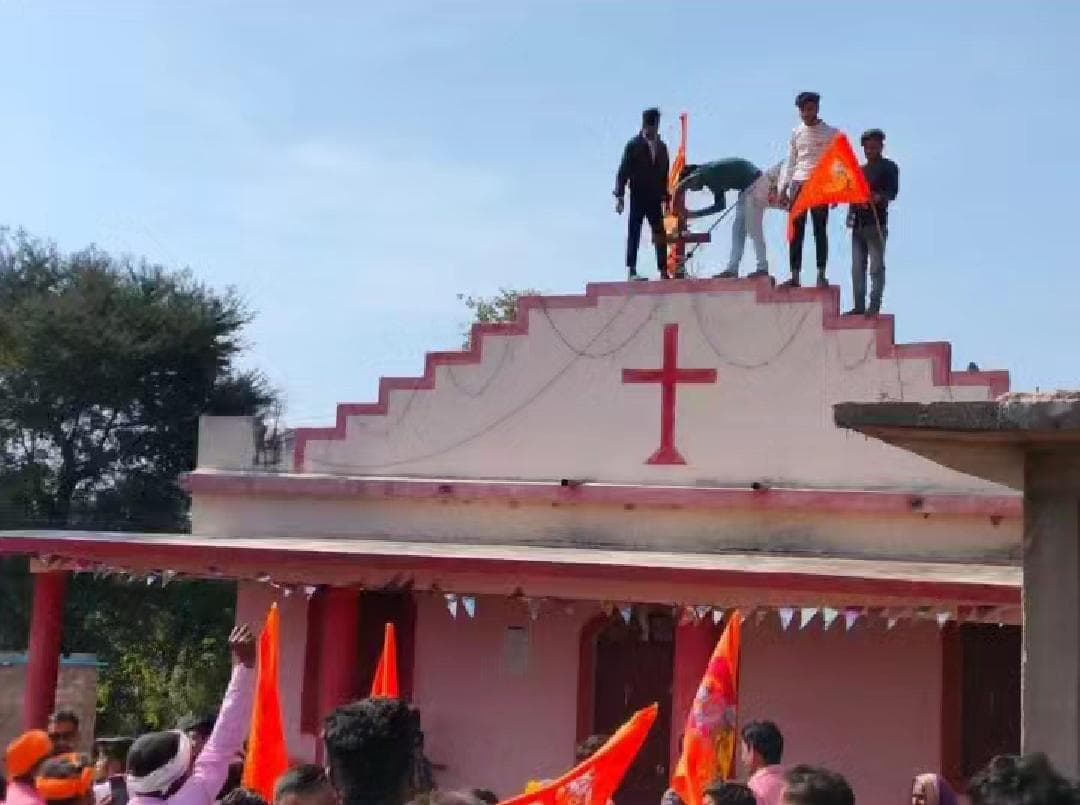MUMBAI – In the wake of anti-Christian assaults by Hindu activists in central India, which featured the placement of saffron flags on the rooftops of four Protestant churches, local Catholic leaders are calling for increased security ahead of the installation of a new bishop for the local diocese.
The incidents occurred Jan. 21 following Sunday services in the four churches in the Jhabua district of the central Indian state of Madhya Pradesh. According to local media reports, the Hindu militants were celebrating the Jan. 22 consecration of a new temple to the Lord Ram in neighboring Uttar Pradesh state on a site believed to be the Hindu deity’s birthplace.
Indian Prime Minister Narendra Modi, who attended the consecration ceremony, has touted the massive new temple as the cornerstone of a Hindu nationalist renaissance in India.
According to local sources, activists energized on the eve of the consecration ceremony climbed on top of the four churches and prayer halls in Jhabua, shouting Jai Shri Ram (“Hail Lord Ram”), a frequent battle cry of Hindu nationalists, and planted saffron flags on the roofs.
Saffron is the color symbolically associated with Hindu identity in India, and some analysts have described the rise to power of right-wing Hindu nationalism under Modi as representing the “saffronization” of India’s democracy.
Three of the churches involved were Pentecostal prayer halls managed by the Shalom Church, while the fourth was part of the Church of South India, one of the country’s largest Protestant denominations. Visuals of the incident showed a group of youths standing on top of a prayer hall, one of them tying a saffron flag with Lord Ram’s image to the holy cross on the building.
“A crowd started their rally on motorcycles from a local market and ended with hoisting saffron flags. It all seemed pre-planned,” said Bishop Paul Muniya of Shalom Church in comments to Crux.
“They were also carrying batons. The crowd swelled as they moved from one prayer hall to another, starting with about 60 people at the time of first flag hoisting to over 200 people in the last one,” Muniya said.
A police official told local media that no one has yet filed a complaint over the incidents, but they’re ready to register one. Muniya, however, said local police had tried to dissuade Christians from making a complaint, advising them instead to “handle the situation with love as taught in our religion.”
“For now, [police told us] not to say anything because they said there is a lot of pressure from the top,” he said.
Pastor Kidar Singh of the Church of South India told Crux that around 4:00 p.m. on Jan. 21, over 50 right-wing activists gathered near his house, waiving saffron flags and shouting slogans near the church compound.
“They were chanting slogans, such as Ek hi Rashtra, ek hi Ram (‘only one nation, only one Ram’),” he said.
According to Singh, the Hindu activists wanted to install saffron flags on his house as well as on top of the church. They allegedly threatened him that they would have the church and his house demolished, and also ensure he was deprived of all facilities from the government under the false charge of illegal conversion.
“I permitted them to do what they wanted, as they were not ready to listen to anyone,” Singh told Crux.
Madhya Pradesh state is governed by Modi’s Hindu nationalist BJP party. In January 2021 it adopted a controversial anti-conversion law establishing penalties of up to ten years in prison for coerced or fraudulent conversion, which critics charge is often used to intimidate religious minorities.
Christians make up roughly four percent of the population of Madhya Pradesh, and are mostly drawn from the deeply marginalized indigenous and tribal communities of the area.
An official of the local Catholic Diocese of Jhabua told Crux that the Jan. 21 incidents have caused alarm in the Catholic community as well, especially in view of two major looming events.
“We have met the Superintendent of Police and he spoke of maintaining peace,” said Fr. Rocky Shah, spokesman for the Diocese of Jhabua.
“The church has two important events scheduled on the weekend in Jhabua for which we have asked them to beef up our security,” Shah said. “On Jan. 26, all our Christian educational institutions mark India’s Republic Day in a grand celebration, and Jan. 27 is the episcopal ordination of Jhabua’s bishop.”
Bishop-elect Peter Rumal Kharadi, who was appointed to the post on Dec. 30, is set to be installed in a Jan. 27 ceremony in Jhabua. Ironically, Kharadi had put out images expressing his congratulations on the consecration of the new Hindu temple in Ayodhya prior to the Jan. 22 event.












